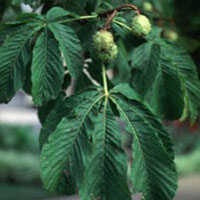Penn Herb Wellness Guide
Horse ChestnutFind Products
 © Steven Foster
© Steven FosterSide Effects
Internal use of horse chestnut seed extracts standardized for aescin at recommended amounts is generally safe. However, in rare cases oral intake of horse chestnut may cause itching, nausea, and upset stomach.11 Based on reports of worsening kidney function in people with kidney disease who received intravenous aescin, horse chestnut should be avoided by anyone with kidney disease.12, 13 People with liver disease should also avoid the use of horse chestnut. There are no known reasons to avoid horse chestnut during pregnancy.14 Topically, horse chestnut has been associated with rare cases of allergic skin reactions. Circulation disorders and trauma associated with swelling may be the sign of a serious condition. Therefore, a healthcare professional should be consulted before self-treating with horse chestnut.
Copyright 2026 TraceGains, Inc. All rights reserved.
Learn more about TraceGains, the company.
The information presented by TraceGains is for informational purposes only. It is based on scientific studies (human, animal, or in vitro), clinical experience, or traditional usage as cited in each article. The results reported may not necessarily occur in all individuals. Self-treatment is not recommended for life-threatening conditions that require medical treatment under a doctor's care. For many of the conditions discussed, treatment with prescription or over the counter medication is also available. Consult your doctor, practitioner, and/or pharmacist for any health problem and before using any supplements or before making any changes in prescribed medications. Information expires December 2026.


